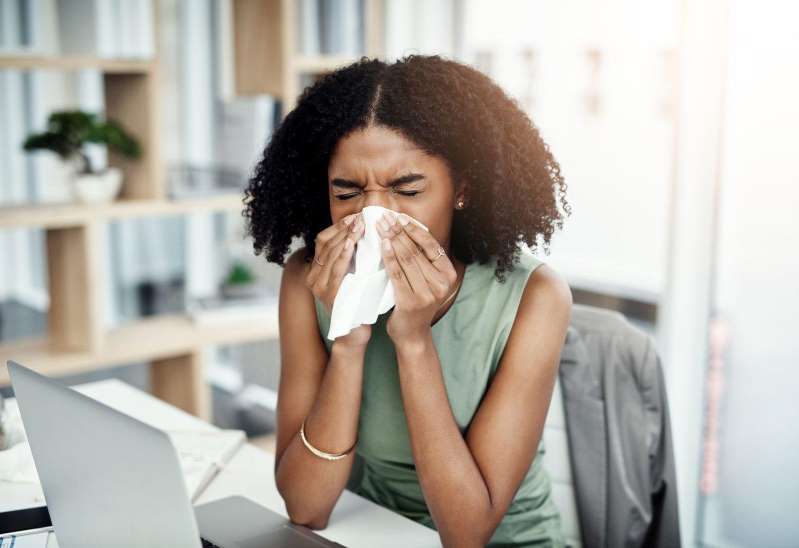Pollen and house dust in the home are a real burden for allergy sufferers. But there are effective measures that can help
After the cold, dark winter months, most of them are longing for a warm spring. For allergy sufferers, however, the critical phase begins exactly then. Because many grasses and pollen have high season from the beginning of February. Nature, which is slowly coming to life again, does not bring joy to everyone.
pollen allergy
For many people, it means primarily irritated eyes, headaches and a runny nose. Over forty percent of Austrians suffer from a pollen allergy. Closely followed by the house dust mites. Erika Jensen-Jarolim, clinical immunologist at the allergy center “AllergyCare” in Vienna Döbling, even sees a year-round burden for allergy sufferers: “As an allergy sufferer, you have to deal with it all year round. Because the plants in the cities take no account of allergies. “
House dust
The increasing environmental pollution, especially the exposure to fine dust, leads to an increased incidence of allergies in the population, explains Wolfram Hötzenecker, dermatologist at the Kepler University Hospital.
Because the irritated mucous membranes in the breath make it easier for allergens to penetrate the body. In order to protect yourself as an allergy sufferer from pollen, house dust and mold allergens in the best possible way, you should take measures within your own four walls now.
Dust catcher
Be careful with carpets and curtains House dust, in which mites cavort, mainly collects in carpets and heavy curtains. Wolfram Hötzenecker from the Kepler University Hospital therefore recommends that allergy sufferers do without carpets and instead have easy-to-clean parquet or laminate floors laid. As an allergy sufferer, you should pay attention to the right filters when vacuuming. Because conventional vacuum cleaner filters have the disadvantage that microscopic amounts of pollen, allergens and house dust get back into the room air and can be inhaled. Hötzenecker recommends using so-called Hepa filters, these keep even the smallest particles in the filter and are therefore better suited for allergy sufferers.
Bed linen
It is well known that you spend most of your time in the bedroom. It is therefore particularly important for allergy sufferers to take the right measures here. Erika Jensen-Jarolim, clinical immunologist, recommends changing your own bed linen regularly (about once a week) and then washing it at at least 60 degrees. Special mite-proof films that can be stretched over mattresses and upholstery offer particularly high protection. They prevent direct contact with the house dust mites and help to alleviate allergy symptoms. The foils are so thin that you can't feel them when you sleep, and they can be washed at high temperatures. The films are available in every pharmacy and in specialist shops.
air cleaner
The indoor air quality currently plays a major role due to the corona crisis. However, this is not a completely new topic for allergy sufferers. Air purifiers are supposed to filter pollutants, including the pollen feared by allergy sufferers, from the air. Erika Jensen-Jarolim is convinced of the effectiveness of such air purifiers. Air purifiers also work with Hepa filters and activated carbon filters. Pollen penetrates living spaces through cracks in windows and doors, is blown in when airing or even carried in with our clothes. An air purifier can therefore be very useful to remove the multitude of accumulated allergens from the room air. The allergy symptoms can be alleviated.
Pets
To be consumed with caution for allergy sufferers. Both Erika Jensen-Jarolim and Wolfram Hötzenecker advise against
to get a pet as an allergy sufferer. Jensen-Jarolim has a simple explanation for this: “Animals are the taxis for house dust mites. When cats or dogs sleep in bed, dust mites are quickly there too. “
And even if one has not yet been diagnosed with an animal allergy, the likelihood of sensitization is
high for allergy sufferers. “We recommend that allergy sufferers avoid anything that has hair and feathers. An aquarium makes more sense for allergy sufferers, ”says Hötzenecker. A drastic measure that is probably difficult to implement, especially for animal lovers.
Filter masks
Due to the corona, we are currently wearing mouth protection at all times. In times like these, this should of course primarily protect against bacteria and viruses. But allergy sufferers in particular can benefit twice from wearing a mouth guard. And that also applies to your own four walls. At least in certain situations.
When dusting or cleaning, for example, it can make sense for those who are allergic to house dust to protect themselves from sneezing attacks. “FFP2 masks also filter dust and pollen. However, the area around the eyes is not protected. It is therefore advisable to wear protective goggles or sunglasses, ”says Hötzenecker.
The masks should be changed regularly for allergy sufferers.
Houseplants
Houseplants generally offer numerous health benefits. They produce oxygen and ensure pleasant, moist room air. Some can even filter the toxins from the air. However, certain indoor plants can be dangerous for allergy sufferers and lead to allergic reactions. Popular houseplants like ficus and gum tree are common causes of allergic reactions. “They are pretty houseplants, but they have a high allergenic potential,” says Hötzenecker. Because the allergens are in the sap and thus reach the leaf surface. There they combine with dust and get into the room air. Caution is therefore advised for allergy sufferers.

